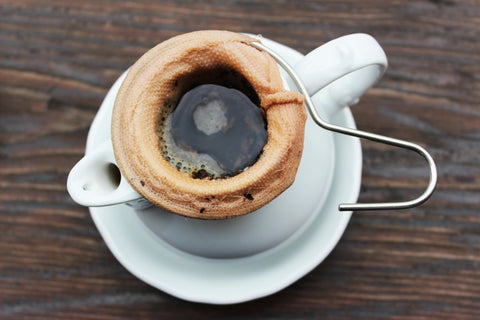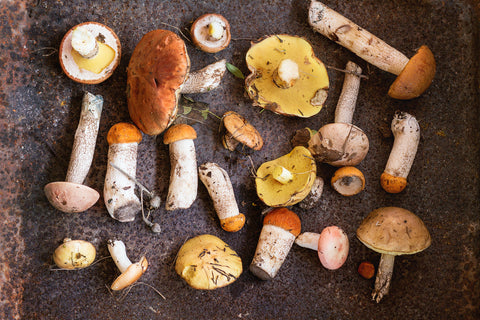Have you ever wondered if those pricey mushroom coffee grounds end up in the trash or your bloodstream? In today's wellness landscape, brewing up "supercoffee" with medicinal fungi is one of the hottest trends—but does your mug actually capture those legendary health benefits, or are they just tossed out with the used filter? In this special report, we track down the lab studies, the brewing science, and the nutritional secrets behind your daily mushroom coffee routine. Let’s dive deep and find out: Do your mushroom-coffee health benefits go down the drain?
Mushroom Coffee: Health Craze or Genuine Functional Boost?
It seems everywhere you turn, a new brand is touting mushroom coffee as the next best thing for energy, immunity, and focus. Whether it’s Lion’s Mane for memory, Chaga for antioxidants, or Cordyceps for energy, health gurus and social media alike are buzzing about these super-brews. But when those magical grounds stay in the filter, do the healthy mushroom compounds actually reach your mug, or are they lost during brewing? And what does real laboratory science reveal about what happens inside your cup?
Let’s answer these pressing questions and uncover how to maximize the nutritional benefits of mushroom coffee.
What’s Really Inside Your Mushroom Coffee?
To know if your mushroom-coffee benefits survive the brew, it helps to know what you’re actually drinking. High-quality mushroom coffees blend ground coffee beans with extracts of renowned fungi like Reishi, Chaga, Lion’s Mane, Cordyceps, and Turkey Tail. Each species delivers a unique punch.
| Mushroom Species | Key Benefits |
|---|---|
| Reishi | Immune support, stress modulation, mood |
| Chaga | Antioxidants, immune support |
| Lion’s Mane | Cognitive support, mood, nerve health |
| Cordyceps | Energy, blood sugar regulation |
| Turkey Tail | Gut and immune health |
But these aren’t just “ground-up mushrooms.” Instead, reputable brands use sophisticated hot-water or dual (water + alcohol) extraction to unlock powerful nutrients—such as β-glucans, cordycepin, adenosine, triterpenes, and polyphenols—from tough fungal cell walls. This torches any myth that only raw mushroom powder has benefits: extracts are designed to dissolve in hot water and pass right through most filters.
How Extraction Makes the Difference
So, what is this “extraction” you see on every package? It’s the industry’s secret weapon for making sure those valuable health-supporting compounds make it into your brewed cup:
- Hot-water extraction: Steams out water-soluble molecules like β-glucans and cordycepin—the key immune boosters—at normal coffee brewing temps (around 90–96°C or 195–205°F).
- Dual extraction: Adds alcohol to also scoop up fat-soluble nutrients, like triterpenes in Reishi and betulinic acid in Chaga, making them water-dispersible and readily available when you brew.
Once this concentrated extract is spray-dried into powder and blended into coffee, it dissolves completely — so the filter doesn’t “trap” your mushroom benefits. This means you really are sipping the benefits, instead of pouring them down the drain!
What Lab Studies Say: Does Mushroom Coffee Deliver?
Want the straight science? Let’s look at what real laboratories have found about mushroom coffee’s functional compounds making the leap from powder to mug:
- Polish Drip-Coffee Study (2024): Researchers made standard filter coffee with added Cordyceps and Lion’s Mane extracts. Results? The final brew retained measurable amounts of cordycepin, adenosine, and β-glucans—provided the water was hot (94°C) and brewed for four minutes. That’s proof those actives don’t get left behind. [source]
- Korean Functional Coffee Experiment (2020): Beans pre-soaked in Cordyceps-Chaga extract and then roasted produced cups delivering 6.8 mg cordycepin and 12 mg β-glucans per 150 ml serving, with antioxidant scores 29% higher than plain coffee. Tasters described the flavor as “typical medium roast with faint earthiness”—no mushroom soup weirdness. [source]
- Temperature and Extraction (2016): Scientists found that polysaccharide yields (long sugar molecules like β-glucans) climbed steadily as brewing water reached 90°C and above, plateauing near boiling. Translation? Water just off the boil releases the most immune-boosting nutrients without ruining coffee flavor. [source]
In sum: Properly extracted mushroom compounds are stable, survive brewing, and pass right through typical coffee filters into your cup.
The Full Scoop on Mushroom Coffee Benefits
Why are so many wellness experts raving about mushroom coffee? Here’s the evidence-backed breakdown:
1. Antioxidant Content
- Both mushrooms (think: Chaga, Reishi, Lion’s Mane) and coffee are rich in antioxidants. These friendly molecules help neutralize free radicals, limiting cell damage and inflammation. The result: Lower risk for chronic diseases, and possibly healthier aging (Quick overview of health benefits).
2. Immune System Support
- Key species like Chaga and Reishi are renowned for immune-boosting β-glucans—proven by clinical and lab studies to enhance your body’s defenses and increase resilience against illness (Reishi Benefits, Chaga Benefits).
3. Adaptogen & Stress Relief
- Fungi such as Reishi aren’t just for immunity—they’re adaptogens, meaning they help the body handle stress by balancing cortisol and other stress hormones. Regular use may support a calm mood and healthy stress response. See how to lower cortisol naturally.
4. Brain & Cognitive Health
- Lion’s Mane has drawn attention for potential cognitive benefits, including sharper memory, better focus, and mental clarity. While most studies are on direct supplement use, some benefits may carry over via well-extracted coffee blends (Lion’s Mane health benefits), and is also covered in our Nootropics and cognitive enhancers guide.
5. Gut & Digestive Support
- Mushroom extracts contain polysaccharides (prebiotic fibers) that aren’t digested by our bodies, but are fermented by helpful gut bacteria. This can mean a healthier gut and better overall digestion. Want to know how mushroom coffee affects your digestion? Read our breakdown on mushroom coffee and digestion.
6. Reduced Caffeine Jitters
- Mushroom coffee blends usually contain just half the caffeine of a standard cup. That means fewer jitters, less anxiety, and smoother energy lifts—without total withdrawal from your morning routine. Learn how mushroom coffee compares to regular coffee.
7. Blood Sugar & Energy Regulation
- Some mushrooms, like Reishi and Cordyceps, may aid blood sugar control by improving insulin sensitivity, according to some early research. While not a replacement for medical treatments, this is a promising “bonus” for those seeking metabolic support.
Will You Reap These Benefits? Here’s How To Maximize Your Brew
Ready to get all these perks in your cup—not your compost bin? Here’s how to make sure your mushroom coffee delivers:
Choose High-Quality, Verified Extracts
Opt for blends that list real, standardized mushroom extracts and disclose how much of each (in milligrams) is present. Products tested for β-glucan or cordycepin content ensure genuine benefits. For more on picking the right form for your lifestyle, see Our guide to mushroom supplement forms.
Brew Using Proven Methods
- Water Temperature: 195–205°F (90–96°C) is ideal—hot enough to fully extract functional compounds, but not so hot to scorch your coffee.
- Brew Time: At least 3–4 minutes ensures maximum extraction; use a French press or slow pour-over for best results.
- Filter Type: Metal mesh and French press models allow even fine extracted particles through, but even standard paper filters do not block the dissolved mushroom nutrients.
Keep It Simple and Consistent
- Shake It Up: Mushroom extract is lighter than coffee grounds and settles in the bag. Mix before measuring to evenly distribute nutrients.
- Skip Extra Sugars: Choose blends without added sugars, flavorings, or fillers for the purest health impact.
- Make It Part of a Smart Diet: Pair with a balanced diet loaded with fruits, veggies, and whole grains for “supercharged” wellness.
- Use Regularly—Not Just Once: Like most adaptogens, mushroom coffee works best when used consistently.
- Mind Your Dose: Most blends are made for daily use, but listen to your body and watch for sensitivity to caffeine or mushrooms.
Set Realistic Expectations
- You won’t get high levels of fiber or protein from mushroom coffee (the extraction targets bioactive compounds, not “whole food” benefits).
- Actual health boosts depend on how much extract is used—check labels for test certifications.
- Clinical research on mushroom coffee itself is still limited; most proven health claims trace back to studies on direct mushroom or supplement use.
The Final Verdict: Sip with Confidence
Bottom line? Properly extracted mushroom powders dissolve into hot water, pass through coffee filters, and deliver measurable β-glucans, cordycepin, antioxidants, and more, right into your mug. Backed by lab studies, mushroom coffee truly offers more than hype.
Brew hot, brew long, and you’ll capture steady, balanced energy—and a shot of functional benefits—without leaving them in the grounds or your trash. If you’re curious to experience the next-level wellness buzz, be sure to choose a dual-extracted, lab-tested blend and savor the difference.
For more on the real science and detailed brewing tips, check out our frequently asked questions in Mushroom Coffee FAQs for First-Timers.
(As always, statements in this article have not been evaluated by the FDA. Mushroom coffee is not intended to diagnose, treat, cure, or prevent any disease.)
Ready for your own functional test drive?
Try out a blend like our Mushroom Kick Lion’s Mane & Chaga—dual-extracted, lab-verified, and crafted for a smooth, rich flavor. Code KICK10 gets you 10% off your first bag!
References
- https://www.webmd.com/diet/
mushroom-coffee-health- benefits - https://www.powdervitamin.com/
blogs/news/discover-the-best- mushroom-coffee-top-reviews- benefits - https://www.goodrx.com/well-
being/diet-nutrition/is- mushroom-coffee-good-for-you - https://www.attis.in/
nutrition/benefits-of- mushroom-coffee-why-you- should-try-it/ - https://lairdsuperfood.com/
blogs/news/shroom-coffee


